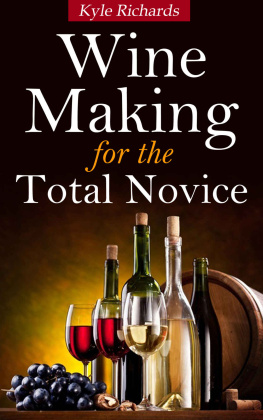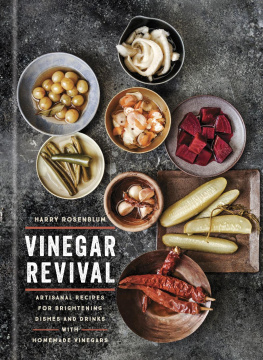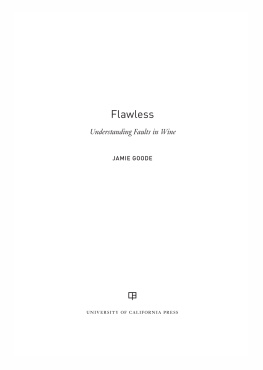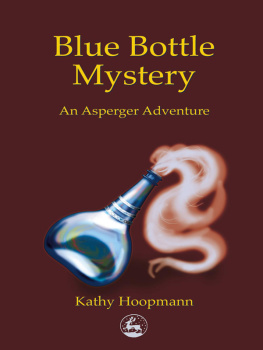Benjamin Wallace - The Billionaires Vinegar: The Mystery of the Worlds Most Expensive Bottle of Wine
Here you can read online Benjamin Wallace - The Billionaires Vinegar: The Mystery of the Worlds Most Expensive Bottle of Wine full text of the book (entire story) in english for free. Download pdf and epub, get meaning, cover and reviews about this ebook. year: 2008, publisher: Crown Publishers, genre: Detective and thriller. Description of the work, (preface) as well as reviews are available. Best literature library LitArk.com created for fans of good reading and offers a wide selection of genres:
Romance novel
Science fiction
Adventure
Detective
Science
History
Home and family
Prose
Art
Politics
Computer
Non-fiction
Religion
Business
Children
Humor
Choose a favorite category and find really read worthwhile books. Enjoy immersion in the world of imagination, feel the emotions of the characters or learn something new for yourself, make an fascinating discovery.

- Book:The Billionaires Vinegar: The Mystery of the Worlds Most Expensive Bottle of Wine
- Author:
- Publisher:Crown Publishers
- Genre:
- Year:2008
- Rating:5 / 5
- Favourites:Add to favourites
- Your mark:
- 100
- 1
- 2
- 3
- 4
- 5
The Billionaires Vinegar: The Mystery of the Worlds Most Expensive Bottle of Wine: summary, description and annotation
We offer to read an annotation, description, summary or preface (depends on what the author of the book "The Billionaires Vinegar: The Mystery of the Worlds Most Expensive Bottle of Wine" wrote himself). If you haven't found the necessary information about the book — write in the comments, we will try to find it.
The Billionaires Vinegar: The Mystery of the Worlds Most Expensive Bottle of Wine — read online for free the complete book (whole text) full work
Below is the text of the book, divided by pages. System saving the place of the last page read, allows you to conveniently read the book "The Billionaires Vinegar: The Mystery of the Worlds Most Expensive Bottle of Wine" online for free, without having to search again every time where you left off. Put a bookmark, and you can go to the page where you finished reading at any time.
Font size:
Interval:
Bookmark:
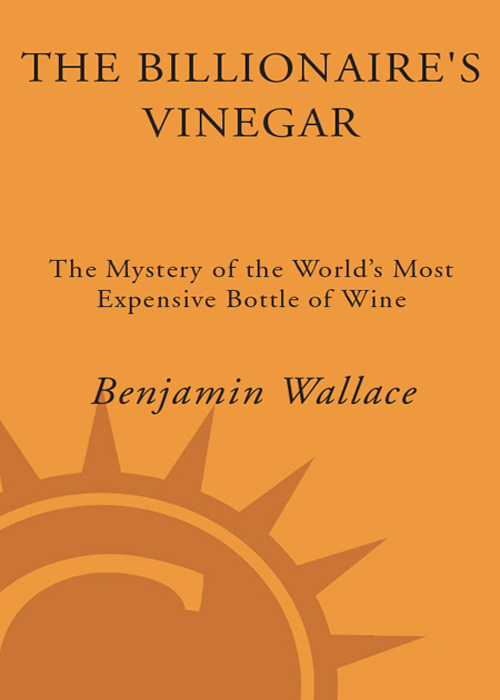
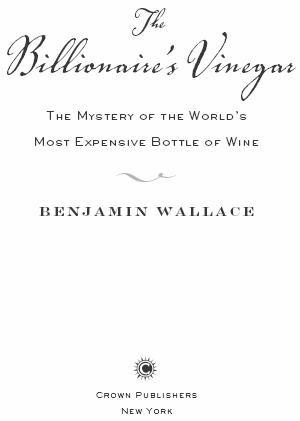
CONTENTS
To my parents,
and in memory of Claire Wickham Woodroffe
CHAPTER 1

LOT 337
A HUSH HAD COME OVER THE WEST ROOM. PHOTOGRAPHERS flashes strobed the standing-room-only crowd silently, and the lone sound was the crisp voice of the auctioneer. To the world, Michael Broadbent projected a central-casting British cool, but under the bespoke suit, he was practicing a kind of mind control that calmed him in these situations. The trick was to focus narrowly, almost autistically, on numbers: lot number, number of bidders, paddle numbers, bid steps.
Even after all these years, he still found it bracingly creative to conjure excitement out of a heap of dirty old bottles. No matter how many of them the fifty-eight-year-old Broadbent might see, he retained his boyish sense of marvel at the longevity of wine. Inert antiques were all very well, but there was magic in old winea mysterious and wonderful alchemy in something that could live and change for two hundred years and still be drinkable.
Auctioneer was Broadbents most public role, but it was only one of his distinctions in the wine world. In London he cut a familiar figure, pedaling to work each day on his Dutch ladies bicycle with basket, legs gunning furiously, a trilby hat perched on his head. Often he was elsewhere, and he kept up a brutal schedule. As founding director of the Christies wine department, he had spent the last two decades crisscrossing the planet, cataloging the dank and dusty contents of rich mens cellars, tasting tens of thousands of fine wines, and jotting his impressions in slender red hardcover notebooks. Those unassuming scribblings amounted to the most comprehensive diary of wine ever recorded. That diary now consisted of sixty of the Ideal notebooks, and he had collected them in a published tome that was the standard reference on old wines. Under Broadbents direction, Christies had largely invented and come to dominate the global market in old and rare wines. While Christies as a whole was smaller than its great rival, Sothebys, its wine department was more than twice as big, bringing in 7.3 million the previous season.
Broadbents peers in the trade acknowledged that his palate was the most experienced in the world. His pocket textbook on wine tasting, the definitive work of its kind, was in its eleventh edition, having sold more than 160,000 copies, and had been translated into eight languages. Any collector hosting an event that aspired to any seriousness made sure to invite Broadbent and his famously sensitive nose. When he arrived at a wine gathering, if so much as a trace of woodsmoke or the merest whiff of cigarette ash besmirched the air, Broadbent would scrunch up his nose, and everything would come to a halt while windows and doors were flung open.
A lean six feet tall, Broadbent had a fringy sweep of whitening hair, and his smile, distinctly hail-fellow-well-met, was tempered by the cocked eyebrow of a worldly man. He looked more aristocratic than many of the dukes and princes alongside whom he sat on Christies board of directors.
When Broadbent tasted, he would lay his wristwatch next to his little red notebook, so that he could time the wines changes in the glass. During lulls, if a piano was on hand, he might charm guests with some Brahms, or he might go off by himself to sketch the local scenery.
He was happy to opine, at these tastings, on the wines under consideration. He had a knack for putting wine into memorable words. Sometimes he borrowed from literature, describing one wine as black as Egypts night. More often, he minted his own rakish descriptions, seeing a woman in every wine. A 79 Ptrus reminded him of Sophia Loren: You can admire them, but you dont want to go to bed with them. A double magnum of 47 Cantenac-Brown evoked chocolate and schoolgirls uniforms.
THE TASTE OF the wine he was selling right now in London, just past 2:30 p.m. on Thursday, December 5, 1985, was impossible to know. December 5 had special meaning for Broadbent; it was the same date that James Christie, in 1766, had held the auction houses very first sale. Moments earlier, Broadbent had stepped up to the rostrum in a three-piece suit with a pocket square, and peered out at the room through his eyeglasses.
Lot 337 was the first item of the afternoon session and had been carefully removed from its green felt berth in a glass case nearby. Lucy Godsal, a secretary in Broadbents office, held the bottle aloft for the room to see. She looked very Christiesblond, headband, pearl necklaceand Broadbent liked her; she was smart, hardworking, and pretty.
Broadbent had never sold anything quite like this before. A Chteau Lafite from 1787, it was the oldest authenticated vintage red wine ever to come up for auction at Christies. And that was the least of its merits. The bottle was engraved with the initials Th.J. As Broadbent had described it in the auction catalog, Th.J. are the initials of Thomas Jefferson. Almost miraculously, the bottle was full of wine and appeared to have survived two centuries intact. The container itself was beautiful and distinctive. This is one time, Broadbent quipped to the crowd, when the buyer will get something back on the bottle.
The admittedly fragmentary tale of how the bottle had been found only added to its mystique. According to Hardy Rodenstock, the German collector who had consigned the bottle to Christies, in the spring of 1985 workers tearing down a house in Paris had broken through a false wall in the basement and happened upon a hidden cache of extremely old wines. The Lafite, inscribed with the initials of the Founding Father, who had lived in Paris from 1784 to 1789 and was the foremost American wine connoisseur of his day, had been among them.
The integrity of the seals, and the high fill levels, Rodenstock had told Broadbent, were remarkable for their age. The cellar had been almost hermetically preserved, its steady temperature in the sweet spot of 50 to 57 degrees Fahrenheit. Rodenstock theorized that the bottles had been walled up to protect them during the chaos of the French Revolution, and had lain undisturbed for two hundred years.
Not surprisingly, Rodenstock refused to divulge the precise location, the exact number of bottles, or anything else about the discovery, despite Broadbents entreaties. Rodenstock was the leading private collector in Europe, and he had already made a name for himself in rare-wine circles as an unusually skilled bottle hunter. Though he was a longtime customer of Christies, Rodenstock was a competitor when it came to obtaining private cellars. Private-cellar purchases were often cash deals that went unreported to tax authorities. A certain reticence about his sources was to be expected.
Broadbent felt there were a couple of possibilities. One was that the bottle had indeed been discovered during the excavations of the old Marais district in Paris, much of which had recently been torn up and redeveloped. A rumor less credited by Broadbent, and which he had no intention of putting in the catalog copy, was that the bottle had been part of some sort of Nazi cellar.
Broadbent knew Rodenstock well, trusted him, and would not normally be too concerned with how he had obtained the bottle. But to Broadbents annoyance, a historical researcher in America had recently been making noises in the press, questioning whether the bottle was in fact Jeffersons. Broadbent had conducted his own research and was satisfied that the circumstantial evidence argued overwhelmingly in favor of the attribution. He couldnt prove it, but on balance, the inducements to proceed outweighed any risk of embarrassment.
Next pageFont size:
Interval:
Bookmark:
Similar books «The Billionaires Vinegar: The Mystery of the Worlds Most Expensive Bottle of Wine»
Look at similar books to The Billionaires Vinegar: The Mystery of the Worlds Most Expensive Bottle of Wine. We have selected literature similar in name and meaning in the hope of providing readers with more options to find new, interesting, not yet read works.
Discussion, reviews of the book The Billionaires Vinegar: The Mystery of the Worlds Most Expensive Bottle of Wine and just readers' own opinions. Leave your comments, write what you think about the work, its meaning or the main characters. Specify what exactly you liked and what you didn't like, and why you think so.

